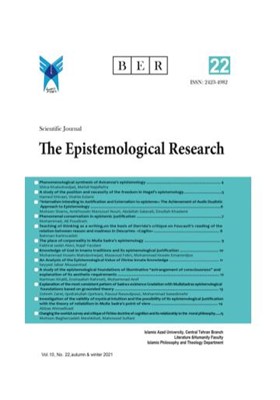“Internalism intending to Justification and Externalism to episteme": The Achievement of Audi's Dualistic Approach to Epistemology
Subject Areas : Epistemological researchesMohsen Shams 1 * , Amirhossein Mansouri Nouri 2 , abdollah salavati 3 , ٍEinollah Khademi 4
1 - P.h.d student/ Shahid Rajaei Teacher Training University
2 - P.h.d student/ Shahid Rajaei Teacher Training University
3 - Associate professor of Islamic sciences department, Shahid Rajaee teacher training university
4 - Professor of University of Shahid Rajaee
Keywords: "Internalism", "Externalism", "Accessing", " Justification", "Knowledge",
Abstract :
During the past fifty years the internalism/externalism dichotomy in regard with justification and knowledge has been controversial, and inclination toward either of them has been considered as epistemological view of contemporary epistemologists. In opposition to externalism, internalism assumed all factors of justification and knowledge are internal affairs. Robert Audi has a combinatory theory: "internalism about Justification and externalism about Knowledge". The central problem under investigation in this paper is the possibility and origins of Audi's view and how it can be distinguished from the others. Like Gattier, Audi takes a critical position against the tripartite definition of knowledge, discussing the differences between the foundations of knowledge vs. justification, and argued that knowledge, due to its dependence on truth, is not accessible like justification. The combinatory of the theory and its elaboration in regard with justification and knowledge is based on both Audi's dualistic view toward epistemology and his belief in the difference of the accessibility of two parallels in epistemology i.e. justification and knowledge. He has regarded the justification as an internal and the episteme as external. Audi’s doctrine is the combined and detailed one on the nature of justification and episteme.
اعتماد، شاپور، آیا معرفت، باور صادق موجه است؟ (ترجمه مقاله ادموند گتیه)، تهران: فصلنامه ارغنون, (پاییز و زمستان 74)، 1394، صص 321-325.
آئودی، رابرت .(1394). معرفتشناسی، ترجمه علی اکبر احمدی، تهران: پژوهشگاه فرهنگ و اندیشه اسلامی.
پویمن، لوئیس. پی.( 1387). معرفتشناسی(مقدمه ای بر نظریه شناخت؛ترجمه رضا محمدزاده)، چاپ اول،تهران: انتشارات دانشگاه امام صادق(علیه السلام).
شمس، محسن؛ منصوری نوری، امیرحسین؛ صلواتی، عبدالله؛ خادمی، عین الله؛ توجیه ساختاری به مثابه دستاورد درونگروی آئودی، دوفصلنامه ی علمی پژوهشی پژوهشهای معرفتشناختی، شماره (پاییز و زمستان1398).18، صص 45-63.
شمس، منصور .( 1395). آشنایی با معرفتشناسی، تهران: طرح نقد.
کشفی، عبدالرسول، تعریف سه جزئی معرفت و شرط چهارم، نامه حکمت،(بهار و تابستان1383)، صص 10-28.
Alston, William. p., Internalism & Externalism in Epistemology. In E. Craig, The Shorter Routledge Encyclopedia of Philosophy, New York: Routledge, 2005.
Armstrong, D. M., Belief Truth and Knowledge (re-issued in digital printed version). New York: Cambridge, 2008.
Audi, Robert. The structure of Justification. New York: Cambridge, 1993.
________. Epistemology; A Contemporary Introduction to the Theory of Knowledge (Third ed.). New York: Cambridge, 2011.
________. Epistemological Internalism and Grounds. In R. Audi, Rational Belief; Structure, Grounds and Intellectual virtue (pp. 119-214). New York: OXFORD, 2015.
Chisholm, Roderick. M. Theory of knowledge (third Edition). New Jersy: Prentice-Hall International, Inc, 1989.
Dancy, Jonathan, Ernest Sosa, and Matthias Steup. A Cpmpaninon to Epistemology. UK: Wiley-Blacwell, 2010.
Gettier, E.. Is Justified True Belief Knowledge? , Analysis, 23, (1963, June), 121-123.
Goldman, Alvin. I. A Causal Theory of Knowing, The Journal of Philosophy, 64, (1967, June 22), 357-372.
________. Strong and Weak Justification. philosophical perspectives, 2, Epistemology, (1988) 51-69.
________. Internalism, Externalism, and the Architecture of Justification. Journal of Philosophy, (2009) 1-30.
Moser, Paul. K. Epistemology. In R. Audi, The Cambridge Dictionary of Philosophy (Second Edition) (p. 277). New York: Cambridge (1999).
Pierson, R.. Alston's concept of justification. Teorema, (2003) 49-58.
Plato. Theaetetus. In Plato, & w. i. edited (Ed.), Complete Works (p. 210d). New York: company Indianapolis/Cambridge, (1997).
Steup, M. Epistemic Deontologism. In R. Audi, The Cambridge encyclopedia of Philosophy (p. 271). New York: Cambridge, (1999).
_||_
